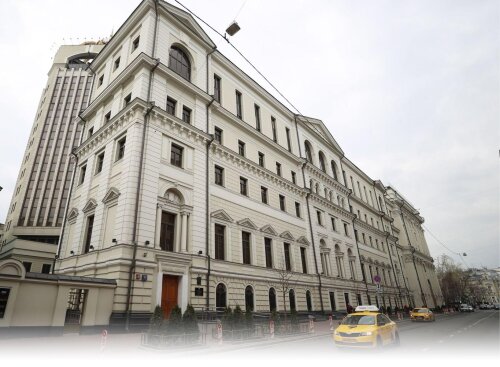Best Restructuring & Insolvency Lawyers in Russia
Share your needs with us, get contacted by law firms.
Free. Takes 2 min.
Or refine your search by selecting a city:
List of the best lawyers in Russia

About Restructuring & Insolvency Law in Russia
Restructuring and insolvency law in Russia governs the processes by which financially distressed companies and individuals address payment difficulties. This branch of law provides for the protection of creditors' rights, enables debt recovery, and allows for the reorganization or liquidation of businesses unable to satisfy their financial obligations. The goal is to resolve insolvency in a way that maximizes satisfaction of creditors while considering the potential to rehabilitate troubled debtors. Russian insolvency procedures are regulated primarily by the Federal Law “On Insolvency (Bankruptcy)”, which sets out the legal framework for bankruptcy, rehabilitation, external management, and liquidation.
Why You May Need a Lawyer
Navigating restructuring and insolvency matters in Russia can be complex and fraught with legal pitfalls. You may need legal assistance in the following situations:
- When your business or personal finances are approaching insolvency and you seek options available under Russian law.
- If you are a creditor aiming to recover debts from an insolvent company or individual.
- You require guidance through court proceedings, such as submitting claims or participating in creditors' meetings.
- Your business is being sued for debt recovery and you need to defend against bankruptcy claims.
- You wish to initiate corporate restructuring to improve your company’s financial stability and avoid bankruptcy.
- You need to assess legal risks and liabilities for management, owners, or board members in insolvency scenarios.
- A foreign investor with assets in Russia seeks to protect interests during a Russian insolvency process.
- You want to explore debt restructuring, out-of-court settlements, or amicable agreements with creditors.
Legal counsel ensures compliance with formal procedures, maximizes your rights and obligations, and improves your chances of a favorable outcome.
Local Laws Overview
Russian restructuring and insolvency matters are primarily governed by the Federal Law “On Insolvency (Bankruptcy)”. Here are the main features relevant to both individuals and companies:
- Initiation of Proceedings: Bankruptcy can be initiated by debtors themselves, creditors, or state authorities when monetary obligations have not been met for at least three months.
- Stages of Bankruptcy: For companies, stages include supervision, financial rehabilitation, external management, bankruptcy proceedings (liquidation), and amicable settlement. For individuals, a simplified procedure applies.
- Court Involvement: The Arbitrazh Court (commercial court) oversees insolvency cases, appointing insolvency administrators to manage the process.
- Creditor Claims: Creditors must file their claims with the court within a specified time to be included in the creditors' register.
- Moratorium: Once a case is accepted, a stay is imposed, suspending enforcement actions against the debtor.
- Managerial Liability: Directors and key managers can be held personally liable for wrongful trading or actions leading to insolvency.
- Restructuring Options: Corporate restructuring, external management, and amicable settlements are available to try to restore solvency before liquidation.
- Priority of Claims: Creditors are paid in a strictly regulated order, with secured claims taking priority, followed by employees, tax authorities, and unsecured creditors.
- Asset Sales and Clawbacks: Transactions that disadvantage creditors or are deemed preferential or fraudulent may be set aside by the court.
Frequently Asked Questions
What is the difference between restructuring and bankruptcy in Russia?
Restructuring refers to measures taken by a business or individual to reorganize finances and avoid bankruptcy, which may include debt renegotiation or management changes. Bankruptcy is a formal court process for declaring insolvency, which can result in liquidation or an approved recovery plan.
Who can initiate bankruptcy proceedings in Russia?
Bankruptcy can be initiated by the debtor, creditors, or certain state bodies such as the Federal Tax Service. The usual condition is that debts remain unpaid for at least three months and exceed a legally defined threshold.
Can individuals file for bankruptcy in Russia?
Yes, individuals can file for personal bankruptcy in Russia provided their debt exceeds a set amount and they are unable to meet payment obligations. The procedures are simpler than for businesses, but similar principles apply.
What are the stages of corporate bankruptcy?
The main stages include supervision (observation), financial rehabilitation, external management, bankruptcy proceedings (liquidation), and the possibility of amicable settlement at any stage.
What is a bankruptcy manager and what do they do?
A bankruptcy manager is a licensed professional appointed by the court to oversee an insolvent entity’s property, analyze financial standing, and manage the process of satisfying creditor claims.
How are creditors’ claims prioritized in bankruptcy?
Claims are satisfied in a particular order: first secured creditors, then employee wages and social obligations, followed by tax authorities, and then unsecured creditors. Shareholders generally have the last priority.
Is it possible to avoid liquidation during bankruptcy proceedings?
Yes, there are legal mechanisms such as financial rehabilitation, external management, or amicable settlement that can allow a debtor company to restructure and potentially continue operations.
What liabilities do company directors face in insolvency?
Directors, owners, and board members may be held personally liable for debts in cases of misconduct, such as concealing assets, preferential payments, or actions that worsen insolvency.
Are foreign creditors protected in Russian insolvency proceedings?
Foreign creditors can participate in Russian insolvency cases, but must comply with procedural rules. They have the same standing as domestic creditors in the ranking of claims.
How long does bankruptcy procedure typically take in Russia?
The timeline varies, but most cases take from several months up to several years, depending on the complexity, number of creditors, and stages involved.
Additional Resources
If you need more information or support on restructuring and insolvency matters in Russia, consider consulting the following entities:
- Federal Tax Service - Maintains bankruptcy registers and supervises insolvency administration
- Arbitrazh Courts of the Russian Federation - Responsible for all bankruptcy cases
- Self-Regulatory Organizations (SROs) of Insolvency Practitioners - Oversee bankruptcy managers
- The Russian Chamber of Commerce and Industry - Offers business and legal advice for companies
- Professional legal associations and law firms with expertise in insolvency and restructuring
Next Steps
If you believe you require legal assistance with restructuring or insolvency in Russia, take these steps:
- Gather all relevant documents such as debt agreements, financial statements, and correspondence with creditors.
- Assess your exact financial position, including total debts and available assets.
- Contact an experienced lawyer or legal firm specializing in insolvency in Russia for an initial consultation.
- Discuss your options for restructuring, negotiations with creditors, or formal insolvency procedures.
- Prepare to act quickly, as delays can limit available legal solutions.
- Keep communication lines open with creditors and all stakeholders throughout the process.
Early legal intervention can help safeguard your interests, ensure compliance with procedural requirements, and improve the likelihood of a favorable resolution.
Lawzana helps you find the best lawyers and law firms in Russia through a curated and pre-screened list of qualified legal professionals. Our platform offers rankings and detailed profiles of attorneys and law firms, allowing you to compare based on practice areas, including Restructuring & Insolvency, experience, and client feedback.
Each profile includes a description of the firm's areas of practice, client reviews, team members and partners, year of establishment, spoken languages, office locations, contact information, social media presence, and any published articles or resources. Most firms on our platform speak English and are experienced in both local and international legal matters.
Get a quote from top-rated law firms in Russia — quickly, securely, and without unnecessary hassle.
Disclaimer:
The information provided on this page is for general informational purposes only and does not constitute legal advice. While we strive to ensure the accuracy and relevance of the content, legal information may change over time, and interpretations of the law can vary. You should always consult with a qualified legal professional for advice specific to your situation.
We disclaim all liability for actions taken or not taken based on the content of this page. If you believe any information is incorrect or outdated, please contact us, and we will review and update it where appropriate.
Browse restructuring & insolvency law firms by city in Russia
Refine your search by selecting a city.















